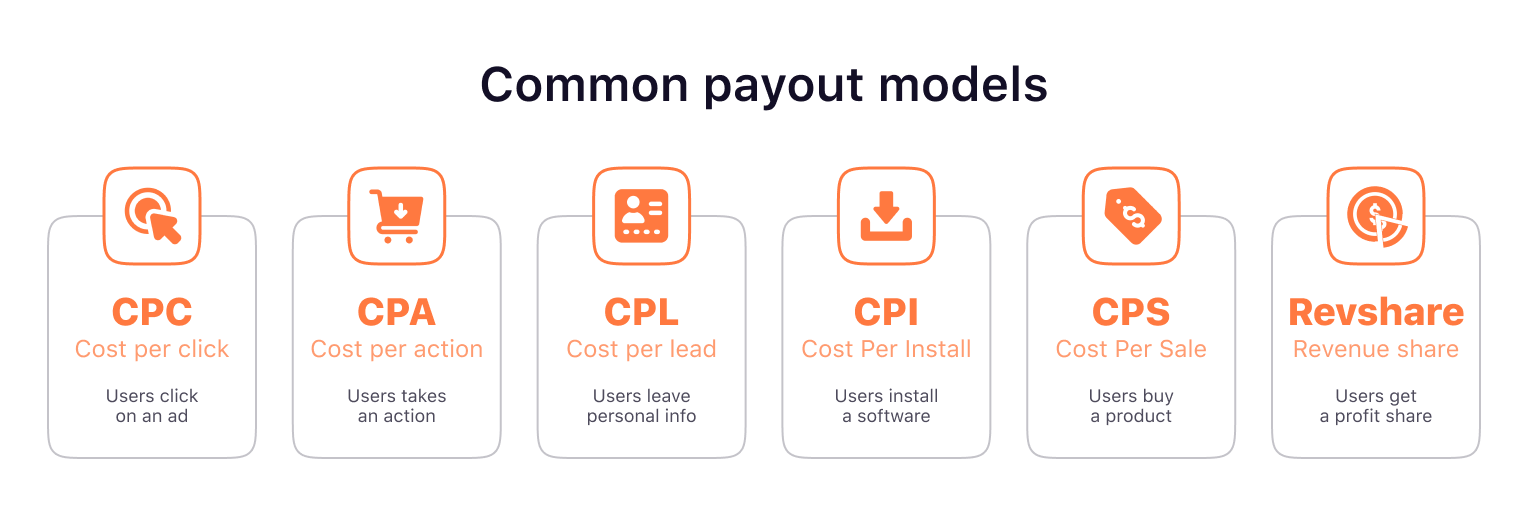Navigating through the bustling world of affiliate marketing might have led you to come across the CPA network meaning. Understanding this concept is crucial for leveraging your efforts and maximizing your earnings.
Let’s delve deeper into what a CPA network entails and how it can benefit you.
CPA definition stands for “Cost Per Action” or “Cost Per Acquisition.” This model is all about getting paid when someone takes a specific action linked to your promotional efforts. Unlike other advertising models where payment is for visibility or clicks, CPA focuses solely on actions that indicate higher user engagement, like signing up for a service, completing a purchase, or filling out a form.
A CPA network serves as an intermediary between affiliates (that’s where you come in) and advertisers looking to promote their products or services. These networks simplify the process by handling the management and tracking of affiliate programs, offering a centralized platform where affiliates can find and join programs, access promotional materials, and get paid.
Let’s get to the heart of the matter: common affiliate models in CPA networks. There are 6 types of such payout models: CPC, CPA, CPL, CPI, CPS and RevShare.

In the CPA model, affiliates are rewarded when a user not only clicks on the affiliate link but also completes a certain action. These actions can include making a purchase, signing up for a newsletter, or subscribing to a service. So, if an affiliate is promoting a software company and a user signs up for a trial, the affiliate is compensated for that action.
This model compensates affiliates for every lead generated. A lead is defined as a potential customer who shows interest in a product or service by sharing contact information.
There are 2 types of the CPL model:
This payout model applies specifically to mobile apps, where marketers are paid for each app installed by a user. It’s frequently seen in the mobile gaming industry. For instance, if an affiliate is promoting a new mobile game and a user installs this game through their referral, the affiliate earns a commission.
According to this model, affiliates earn a commission every time a user clicks on their advertising link. So, if an affiliate promotes a product through a blog and a reader clicks on the link, the affiliate receives a commission for that click. This is often used in the realms of paid search and display advertising. For example, a fashion blog affiliate might earn based on the number of clicks on the links to a new line of clothing.
CPA networks rarely operate on a CPC model, while affiliates commonly use this model to purchase traffic in advertising networks. An alternative to the CPC model in ad networks for advertisers is the CPM model. In this case, affiliates pay for impressions rather than clicks.
Upon the revenue share model in affiliate marketing, advertisers receive a portion of the income that an advertiser makes from customers referred by the affiliates. This is a popular model in online retail or gambling businesses. For example, an affiliate promoting an online casino might receive a 30% share of the revenue generated from players who deposit money via the affiliate’s referral link.
CPA (Cost Per Action) networks are not just platforms for connecting affiliates and advertisers; they come packed with a variety of features designed to enhance the effectiveness and efficiency of affiliate marketing campaigns. Understanding these features can help you choose the right CPA network and fully leverage its capabilities. Here’s an overview of the key features that most CPA networks offer:
A user-friendly dashboard is essential for affiliates to manage and monitor their campaigns effectively. It typically includes:
CPA networks provide access to a wide range of offers from various advertisers across different industries. This diversity includes:
Tracking is crucial in affiliate marketing as it ensures that every action completed by a referral is accurately recorded and attributed. Features include:
To maintain the integrity of marketing campaigns, CPA networks employ advanced systems to detect and prevent fraudulent activities. These systems are designed to:
CPA networks offer various payment terms to accommodate the diverse preferences and cash flow needs of affiliates. These include:
Effective support and educational resources can significantly impact an affiliate’s success. CPA networks often provide:
To assist affiliates in promoting offers, CPA networks typically offer a range of marketing tools. These can include:
To better understand where you might want to apply, here are some examples of prominent CPA networks:
These networks are known for their reliability and are a good starting point for new and seasoned marketers alike.
To better understand where you might want to apply, here are some examples of prominent CPA networks.

Yellana stands out with its extensive range of over 700 iGaming offers. This includes unique in-house products and exclusive deals. Their offers are continually updated to stay effective and relevant in the fast-paced market.
The company offers a variety of commission types such as CPA, CPL, CPI, CPS, free trial, SOI, DOI, and RevShare, accommodating a wide range of affiliate strategies and goals. The network works with affiliates globally and supports convenient payment methods including Wire, Mastercard, Capitalist, Payoneer, Bank transfer, and Crypto.
Geographically, Yellana operates primarily in Asia, Latin America, and Europe.

Offer.one is the rising star among affiliate networks now. The CPA ad network exclusively focuses on conversion-driven offers from direct advertisers. Although the network was founded only in 2023, it confidently touts its competitive edge: the most lucrative offers or, in other words, the highest payouts. To keep up the bar, the network meticulously selects offers and operates solely in potentially profitable verticals: Crypto, Gambling, Betting and Gaming.
Those who join the network now can avail of exciting opportunities to promote Binance and RollerCoin, a popular online crypto mining simulator game. These offers are allowed to run across almost all countries and many ad formats, including push ads, brand context ads and banners.

Huffson Group is a high-profile affiliate network focusing on the iGaming industry. The affiliate network provides iGaming offers from 50+ brands all over the world, tailored conditions, and a proprietary platform with detailed statistics. First of all, Huffson deals with the CPA model. Among its services, Huffson delivers PWAs, exclusive offers, and customized promotional materials for marketers. Besides gambling affiliates, the company is also thrilled to work with enthusiastic streamers looking to drive casino traffic.
At Huffson, various traffic sources are allowed, except SMS, incentive, bot, fraud and spam traffic. Their in-house fraud detection system ensures the removal of unauthorized traffic, maintaining a secure and trustworthy environment.
Selecting the best CPA network for your needs involves several considerations:
Navigating through the bustling world of affiliate marketing might have led you to come across the CPA network meaning. Understanding this concept is crucial for leveraging your efforts and maximizing your earnings.
Let’s delve deeper into what a CPA network entails and how it can benefit you.
CPA definition stands for “Cost Per Action” or “Cost Per Acquisition.” This model is all about getting paid when someone takes a specific action linked to your promotional efforts. Unlike other advertising models where payment is for visibility or clicks, CPA focuses solely on actions that indicate higher user engagement, like signing up for a service, completing a purchase, or filling out a form.
A CPA network serves as an intermediary between affiliates (that’s where you come in) and advertisers looking to promote their products or services. These networks simplify the process by handling the management and tracking of affiliate programs, offering a centralized platform where affiliates can find and join programs, access promotional materials, and get paid.
Let’s get to the heart of the matter: common affiliate models in CPA networks. There are 6 types of such payout models: CPC, CPA, CPL, CPI, CPS and RevShare.

In the CPA model, affiliates are rewarded when a user not only clicks on the affiliate link but also completes a certain action. These actions can include making a purchase, signing up for a newsletter, or subscribing to a service. So, if an affiliate is promoting a software company and a user signs up for a trial, the affiliate is compensated for that action.
This model compensates affiliates for every lead generated. A lead is defined as a potential customer who shows interest in a product or service by sharing contact information.
There are 2 types of the CPL model:
This payout model applies specifically to mobile apps, where marketers are paid for each app installed by a user. It’s frequently seen in the mobile gaming industry. For instance, if an affiliate is promoting a new mobile game and a user installs this game through their referral, the affiliate earns a commission.
According to this model, affiliates earn a commission every time a user clicks on their advertising link. So, if an affiliate promotes a product through a blog and a reader clicks on the link, the affiliate receives a commission for that click. This is often used in the realms of paid search and display advertising. For example, a fashion blog affiliate might earn based on the number of clicks on the links to a new line of clothing.
CPA networks rarely operate on a CPC model, while affiliates commonly use this model to purchase traffic in advertising networks. An alternative to the CPC model in ad networks for advertisers is the CPM model. In this case, affiliates pay for impressions rather than clicks.
Upon the revenue share model in affiliate marketing, advertisers receive a portion of the income that an advertiser makes from customers referred by the affiliates. This is a popular model in online retail or gambling businesses. For example, an affiliate promoting an online casino might receive a 30% share of the revenue generated from players who deposit money via the affiliate’s referral link.
CPA (Cost Per Action) networks are not just platforms for connecting affiliates and advertisers; they come packed with a variety of features designed to enhance the effectiveness and efficiency of affiliate marketing campaigns. Understanding these features can help you choose the right CPA network and fully leverage its capabilities. Here’s an overview of the key features that most CPA networks offer:
A user-friendly dashboard is essential for affiliates to manage and monitor their campaigns effectively. It typically includes:
CPA networks provide access to a wide range of offers from various advertisers across different industries. This diversity includes:
Tracking is crucial in affiliate marketing as it ensures that every action completed by a referral is accurately recorded and attributed. Features include:
To maintain the integrity of marketing campaigns, CPA networks employ advanced systems to detect and prevent fraudulent activities. These systems are designed to:
CPA networks offer various payment terms to accommodate the diverse preferences and cash flow needs of affiliates. These include:
Effective support and educational resources can significantly impact an affiliate’s success. CPA networks often provide:
To assist affiliates in promoting offers, CPA networks typically offer a range of marketing tools. These can include:
To better understand where you might want to apply, here are some examples of prominent CPA networks:
These networks are known for their reliability and are a good starting point for new and seasoned marketers alike.
To better understand where you might want to apply, here are some examples of prominent CPA networks.

Yellana stands out with its extensive range of over 700 iGaming offers. This includes unique in-house products and exclusive deals. Their offers are continually updated to stay effective and relevant in the fast-paced market.
The company offers a variety of commission types such as CPA, CPL, CPI, CPS, free trial, SOI, DOI, and RevShare, accommodating a wide range of affiliate strategies and goals. The network works with affiliates globally and supports convenient payment methods including Wire, Mastercard, Capitalist, Payoneer, Bank transfer, and Crypto.
Geographically, Yellana operates primarily in Asia, Latin America, and Europe.

Offer.one is the rising star among affiliate networks now. The CPA ad network exclusively focuses on conversion-driven offers from direct advertisers. Although the network was founded only in 2023, it confidently touts its competitive edge: the most lucrative offers or, in other words, the highest payouts. To keep up the bar, the network meticulously selects offers and operates solely in potentially profitable verticals: Crypto, Gambling, Betting and Gaming.
Those who join the network now can avail of exciting opportunities to promote Binance and RollerCoin, a popular online crypto mining simulator game. These offers are allowed to run across almost all countries and many ad formats, including push ads, brand context ads and banners.

Huffson Group is a high-profile affiliate network focusing on the iGaming industry. The affiliate network provides iGaming offers from 50+ brands all over the world, tailored conditions, and a proprietary platform with detailed statistics. First of all, Huffson deals with the CPA model. Among its services, Huffson delivers PWAs, exclusive offers, and customized promotional materials for marketers. Besides gambling affiliates, the company is also thrilled to work with enthusiastic streamers looking to drive casino traffic.
At Huffson, various traffic sources are allowed, except SMS, incentive, bot, fraud and spam traffic. Their in-house fraud detection system ensures the removal of unauthorized traffic, maintaining a secure and trustworthy environment.
Selecting the best CPA network for your needs involves several considerations: